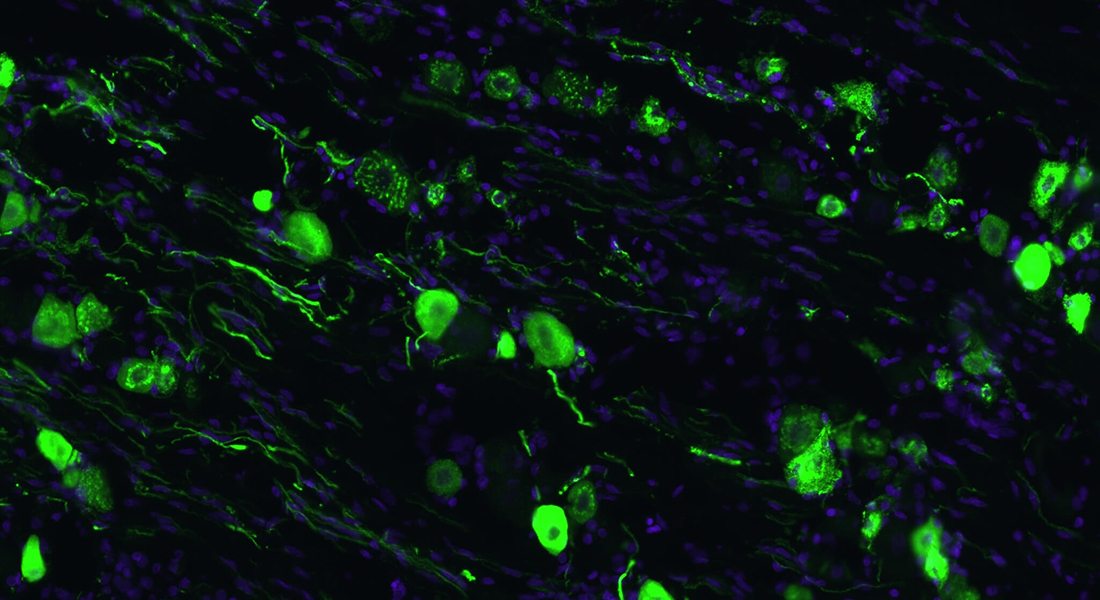The Sensory Biology Group

We direct our research efforts toward the physiological processes of sensory nerves, placing special emphasis on pain-transmitting neurons associated with the trigeminal ganglion. These neurons utilize common biological pathways for signal transmission, adaptation, and protective mechanisms. Our current research focuses on the pathophysiology of migraine pain and the accompanying sensory disturbances. In addition, we investigate the vasculature innervated by these sensory nerves, aiming to identify approaches that enhance resistance to ischemic injuries, such as those occurring in stroke events.
Haanes, K. A. & Edvinsson, L. Atogepant, the first oral preventive treatment for chronic migraine. Lancet 402, 748-749 (2023). https://doi.org:10.1016/S0140-6736(23)01462-9
Nordahl, K. M. L., Fedulov, V., Holm, A. & Haanes, K. A. Intraocular Adeno-Associated Virus-Mediated Transgene Endothelin-1 Delivery to the Rat Eye Induces Functional Changes Indicative of Retinal Ischemia-A Potential Chronic Glaucoma Model. Cells 12 (2023). https://doi.org:10.3390/cells12151987
Reducha, P. V., Bomers, J. P., Edvinsson, L. & Haanes, K. A. Rodent behavior following a dural inflammation model with anti-CGRP migraine medication treatment. Front Neurol 14, 1082176 (2023). https://doi.org:10.3389/fneur.2023.1082176
Bomers, J. P., Grell, A. S., Edvinsson, L., Johansson, S. E. & Haanes, K. A. The MEK Inhibitor Trametinib Improves Outcomes following Subarachnoid Haemorrhage in Female Rats. Pharmaceuticals (Basel) 15 (2022). https://doi.org:10.3390/ph15121446
Christiansen, I. M., Edvinsson, J. C. A., Reducha, P. V., Edvinsson, L. & Haanes, K. A. Dual action of the cannabinoid receptor 1 ligand arachidonyl-2'-chloroethylamide on calcitonin gene-related peptide release. J Headache Pain 23, 30 (2022). https://doi.org:10.1186/s10194-022-01399-8
Edvinsson, J. C. A. et al. Lasmiditan and 5-Hydroxytryptamine in the rat trigeminal system; expression, release and interactions with 5-HT(1) receptors. J Headache Pain 23, 26 (2022). https://doi.org:10.1186/s10194-022-01394-z
Edvinsson, L., Edvinsson, J. C. A. & Haanes, K. A. Identifying molecular targets in trigeminal nociception. Nat Rev Neurol 18, 385-386 (2022). https://doi.org:10.1038/s41582-022-00671-4
Edvinsson, L. & Haanes, K. A. Identifying New Antimigraine Targets: Lessons from Molecular Biology. Trends Pharmacol Sci 42, 217-225 (2021). https://doi.org:10.1016/j.tips.2021.01.002
Edvinsson, L., Haanes, K. A. & Warfvinge, K. Does inflammation have a role in migraine? Nat Rev Neurol 15, 483-490 (2019). https://doi.org:10.1038/s41582-019-0216-y
Edvinsson, L., Haanes, K. A., Warfvinge, K. & Krause, D. N. CGRP as the target of new migraine therapies - successful translation from bench to clinic. Nat Rev Neurol 14, 338-350 (2018). https://doi.org:10.1038/s41582-018-0003-1
Haanes, K. A. et al. Exploration of purinergic receptors as potential anti-migraine targets using established pre-clinical migraine models. Cephalalgia 39, 1421-1434 (2019). https://doi.org:10.1177/0333102419851810
- Optogenetics: Allows for the precise activation of neurons, useful for studying specific neuronal pathways and their signaling mechanisms.
- Injection Models: Useful for inducing and measuring immediate physiological responses to various compounds, shedding light on their roles in nerve function.
- Gene Overexpression Techniques: Enable the examination of the effects of increased levels of certain proteins on nerve physiology.
- Vascular Response Observation: Includes techniques for live monitoring of blood vessel dynamics and neurovascular interactions.
- Neuropeptide Release Studies: Provide measurements of neuropeptide levels, which are crucial for understanding nerve communication and response.
- Calcium Imaging: Offers a window into intracellular calcium changes, which are indicative of nerve activation and function.
- Electrophysiology: Captures detailed information about neuronal activity and ion channel function.
- Behavioral Analysis: Assesses the outward manifestations that result from changes in sensory nerve activity.
- Molecular Profiling: Delivers a comprehensive overview of gene and protein expression changes in sensory nerves, aiding in the interpretation of their functional state.
Master courses
Cellular and Integrative Physiology
Advanced Topics in Physiology
Bachelor courses
Human Physiology (Menneskets fysiologi)
Master and Bachelor projects
see under projects and Department of Biology Project database
Research in the area of trigeminovascular system and sensory neuron biology in the group delves into the intricate relationship between neurovascular innervation and sensory disorders, with a focus on understanding the biological processes of pain-related sensory neurons. The work investigates the trigeminovascular system's role in innervating cerebral arteries, the eye, and the dura, providing crucial insights into conditions such as stroke, glaucoma, and migraine pain. The connection of this system to the brainstem and the hypothalamus underscores its significance in neurovascular and sensory biology. Central to this research is the exploration of Calcitonin Gene-Related Peptide (CGRP), a neuropeptide known for its potent vasodilatory properties, and its therapeutic potential as a treatment for ischemic conditions, highlighted by innovative patent applications.
The methodology adopted in this research area encompasses myography to study vascular responses, as well as molecular biology techniques to target specific pathways such as MEK-ERK and PKC, which could potentially improve stroke outcomes and vascular health. Pain mechanisms are studied through behavioral tests in animal models, shedding light on the detection of allodynia and the modulation of saltatory conduction by CGRP at the node of Ranvier. The research also emphasizes the importance of understanding gender differences in these processes, contributing to the development of targeted, gender-specific therapies. Collectively, this body of work not only advances our fundamental knowledge of the trigeminovascular system but also opens up new avenues for therapeutic intervention in neurovascular and sensory dysfunctions.
Members
| Name | Title | Phone | |
|---|---|---|---|
| Jens Bjelke Kristensen | Industrial PhD | ||
| Kristian Agmund Haanes | Associate Professor |
| Spyridoula Kazantzi | PhD Student | |
| Mette Nyholm Jensen | Guest Researcher | |
Contact information

Kristian Agmund Haanes
Affiliated Associate Professor
August Krogh Building, room 606
Universitetsparken 13
2100 København Ø
